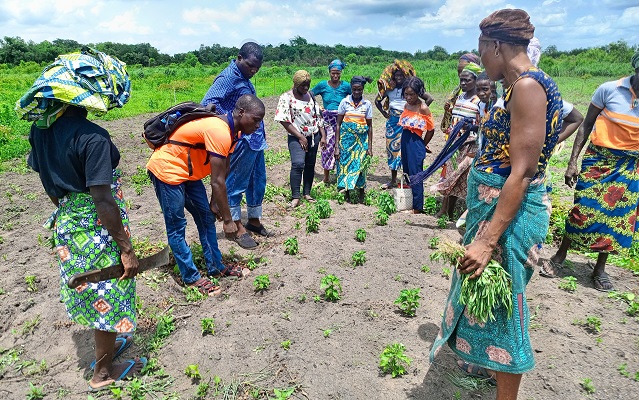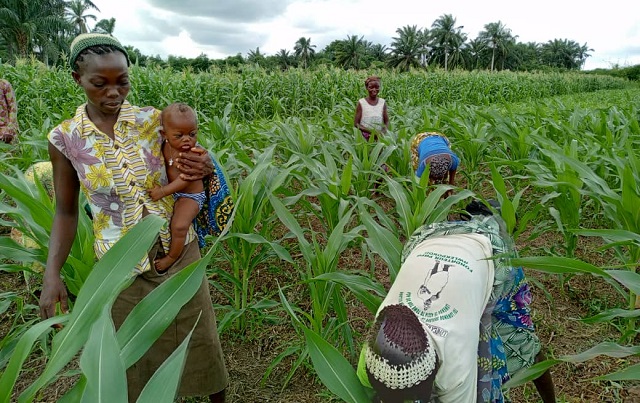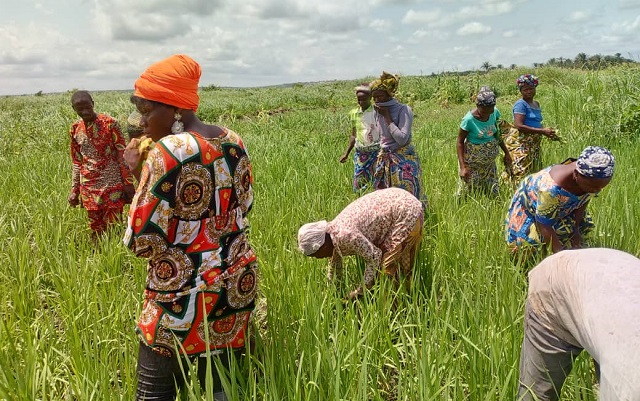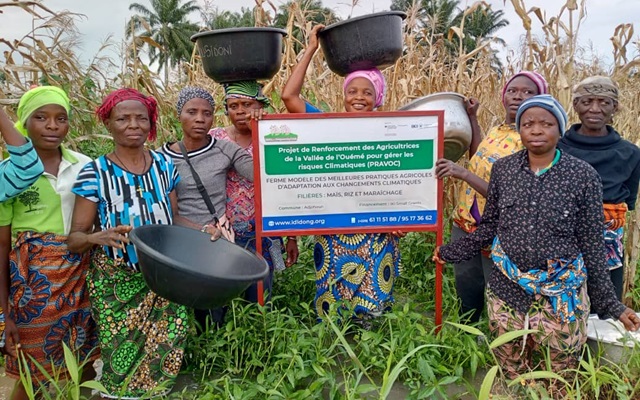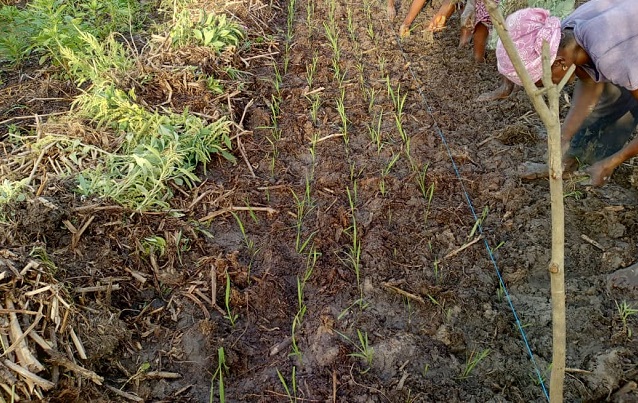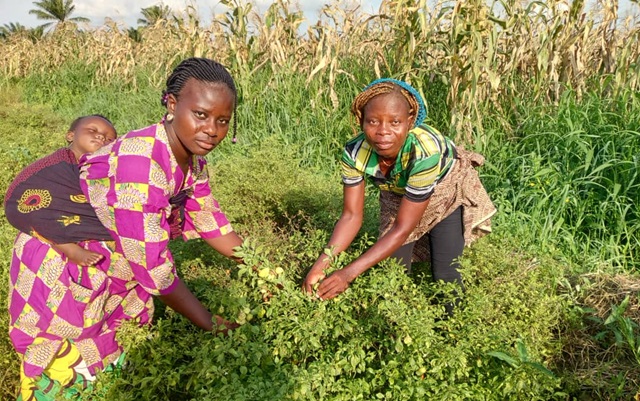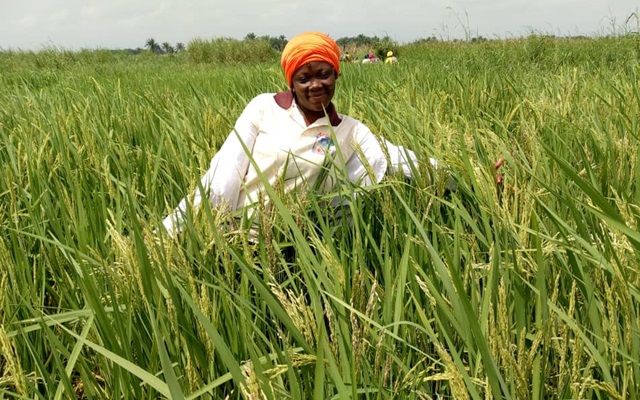Strengthening women farmers in Ouémé valley to manage climate risks
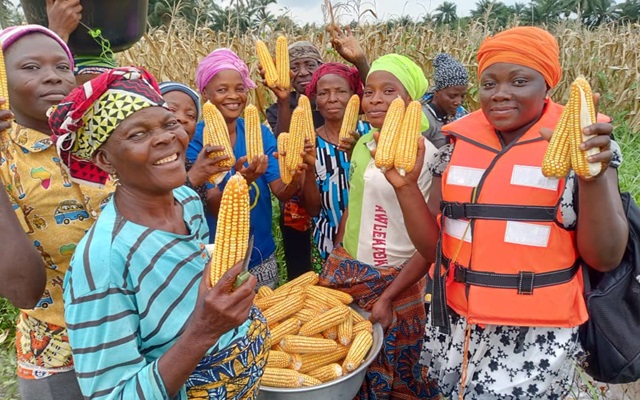
Many people in the municipality of Adjohoun in Benin depend on agriculture, which is highly vulnerable to the impacts of climate change. Female smallholder farmers are especially vulnerable due to the unequal access to land and investment opportunities. The IKI Small Grants project aims to improve the adaptation capacities of vulnerable female smallholder farmers and local stakeholders in the municipality of Adjohoun. This is achieved through access to knowledge, innovative agricultural practices, agricultural equipment, and better management of climate risks.
INITIAL SITUATION
In Benin, more than 70 per cent of the working population is employed in agriculture, which is mainly based on small traditional family farms. They practice rain-fed agriculture, which is completely dependent on weather conditions and largely for self-consumption. The agricultural sector is very vulnerable to the impacts of climate change, which is likely to lead to a further decline in yields of 20-50 per cent by 2050. In the municipality of Adjohoun, the Agonli-Lowé town and Houèdo Wo town are most affected by flooding and late rains. Women are particularly vulnerable to the impacts of climate change because they have little access to land, few investment opportunities, and no control over the distribution of resources resulting from their activities.
TARGET GROUP
The project targets female smallholder farmers from Agonli-Lowé town and Houèdo Wo town in the Adjohoun commune, who work in three key sectors (maize, rice, and market gardening). In total, 200 women benefit directly from the project and 1,400 people indirectly.
VIDEOS FROM THE PROJECT
APPROACH AND ACTIVITIES
The IKI Small Grants project increases the adaptation capacities of vulnerable female smallholder farmers and local stakeholders in the municipality of Adjohoun. This is achieved through access to knowledge, innovative agricultural practices, agricultural equipment, and better management of climate risks.
The project aims to improve agricultural practices of female smallholder farmers. For this, Initiatives pour un Développement Intégré Durable (IDID) studies the agricultural value chain’s vulnerability to climate change with emphasis on gender aspects regarding production, processing, and marketing. The organisation develops resilient agricultural models that combine technologies and best agricultural practices for adaptation according to the needs of farmers in Adjohoun. Moreover, IDID develops training tools and materials for each agricultural value chain. In total, 200 women are trained and are provided with equipment to strengthen their technical capacities.
IDID focuses on climate risks management for local actors. To do so, the organisation carries out a participatory analysis of risks and vulnerabilities to climate change of different stakeholders. The generated results build the basis to provide better operational and easy-to-use guidance to locally elected officials and technical staff, focusing on climate resilience. IDID advocates and trains locally elected officials and technical executives on climate risk management. In addition, the organisation offers technical support to municipal officials in taking responsibility and collaboratively implementing climate change adaptation and climate risk management plans.
LATEST PROJECT HIGHLIGHTS AND IMPACTS
- Study on the vulnerability of the agricultural value chain to climate change and development of resilient agricultural models
- Drawing up a communal adaptation plan, an annual action plan, and a financial mobilisation strategy for the commune of Adjohoun
- Training 25 local players and 200 women in agroclimatology and climate risk management
- Acquisition and supply of agricultural equipment and regular training for women on model farms
CAPACITY DEVELOPMENT
IKI Small Grants supports IDID in their organisational capacity development through:
- Development and implementation of a resource mobilization strategy
- Development and implementation of a communication strategy
- Establishment of a computerized monitoring and evaluation system
- Thematic capacity building on software-driven project development and management
- Definition of an implementation strategy for the strategic plan and training of staff on results-based management
ABOUT THE ORGANISATION
Initiatives pour un Développement Intégré Durable (IDID) is a NGO that was founded in 2004 and registered in 2006. Its mission is to contribute to food security and climate change adaptation, environmental protection, promotion of renewable energies and sustainable management of fragile ecosystems through sustainable initiatives and capacity building of women, men, and vulnerable communities. IDID operates throughout the national territory and is a member of Benin National Committee on Climate Change and Board of Benin GCF NIE.

